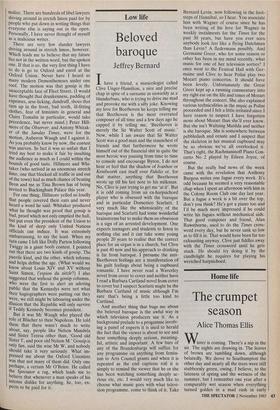Low life
Beloved baroque
Jeffrey Bernard
Ihave a friend, a musicologist called Clive Unger-Hamilton, a nice and precise chap in spite of a surname as unwieldy as a blunderbuss, who is trying to drive me mad and provoke me with a silly joke. Knowing my love for Beethoven he keeps telling me that Beethoven is the most overrated composer of all time and a few days ago he capped it by telling me, 'Beethoven is merely the Sir Walter Scott of music.' Now, while I am aware that Sir Walter Scott was a good man and the staunchest of friends and that furthermore he wrote himself out of the financial shit in quite the most heroic way pausing from time to time to console and encourage Byron, I do not hear or feel that the shadow of Ivanh©e or Kenilworth cast itself over Fidelio or, for that matter, anything that Beethoven wrote up till his last note to his milkman. No, Clive is just trying to get me 'at it'. But it is odd coming from an ex-harpsichord player who is obsessed with the baroque and in particular Domenico Scarlatti. I very much like the whimsicality of the baroque and Scarlatti had some wonderful brainstorms but to make them an obsession is a sign of an arrested development. One expects teenagers and students to listen to nothing else and it can take some young people 20 years to realise that the correct place for an organ is in a church, but Clive is past 40 now and his approach to drinking is far from baroque. I presume the anti- Beethoven feelings are a manifestation of his guilt feelings about being a cupboard romantic. I have never read a Waverley novel from cover to cover and neither have I read a Barbara Cortland novel from cover to cover but I suspect Scarlatti might be the Barbara Cortland of music although I'm sure that's being a little too kind to Cortland.
And another thing that bugs me about the beloved baroque is the awful way in which television producers use it. As a background prelude to a progamme involv- ing a panel of experts it is used to herald the fact that the viewer is about to see and hear something deeply serious, meaning- ful, artistic and important. A few bars of any of the Brandenburgs will suffice for any programme on anything from femin- ism to Arts Council grants and when it is repeated as the end captions roll it is simply to remind the viewer that he or she has been watching something deeply se- rious etc, etc. I would very much like to choose what music goes with what televi- sion programme, come to think of it. Take
Bernard Levin, now following in the foot- steps of Hannibal, so I hear. You associate him with Wagner of course since he has been writing of his love for Wagner in weekly instalments for the Times for the past 50 years, but have you ever seen anybody look less like a flying Dutchman than Levin? A fledermaus possibly. And Germaine Greer, who for some reason or other has been in my mind recently, what music for one of her television sorties? I once went to the Festival Hall with Ger- maine and Clive to hear Polini play two Mozart piano concertos. It should have been lovely. Unfortunately the Great Greer kept up a running commentary into my right ear on the life and times of Mozart throughout the concert. She also explained various technicalities in the musir. as Polini proceeded and I felt a little irritated since I have reason to suspect I have forgotten more about Mozart than she'll ever know. But she isn't Waltzing Matilda and neither is she baroque. She is somewhere between pebbledash and ornate and I suspect that the skeleton in her musical cupboard may be so obvious we've all overlooked it. That's right, the Rachmaninoff Piano Con- certo No 2 played by Eileen Joyce, of course.
But the really bad news of the week came with the revelation that Anthony Burgess writes one fugue every week. It's odd because he seemed a very reasonable chap when I spent an afternoon with him in the Colony Room Club one day last year. But a fugue a week is a bit over the top, don't you think? He's got a piano too and I'd be much more impressed if he could write his fugues without mechanical aids. That good composer and friend, Alan Rawsthorne, used to do the Times cross- word every day, but he never sank so low as to fill it in. That would have been far too exhausting anyway. Clive just fiddles away with the Times crossword until he gets stuck. He should try doing it by the candlelight he requires for playing his wretched harpsichord.






















































 Previous page
Previous page